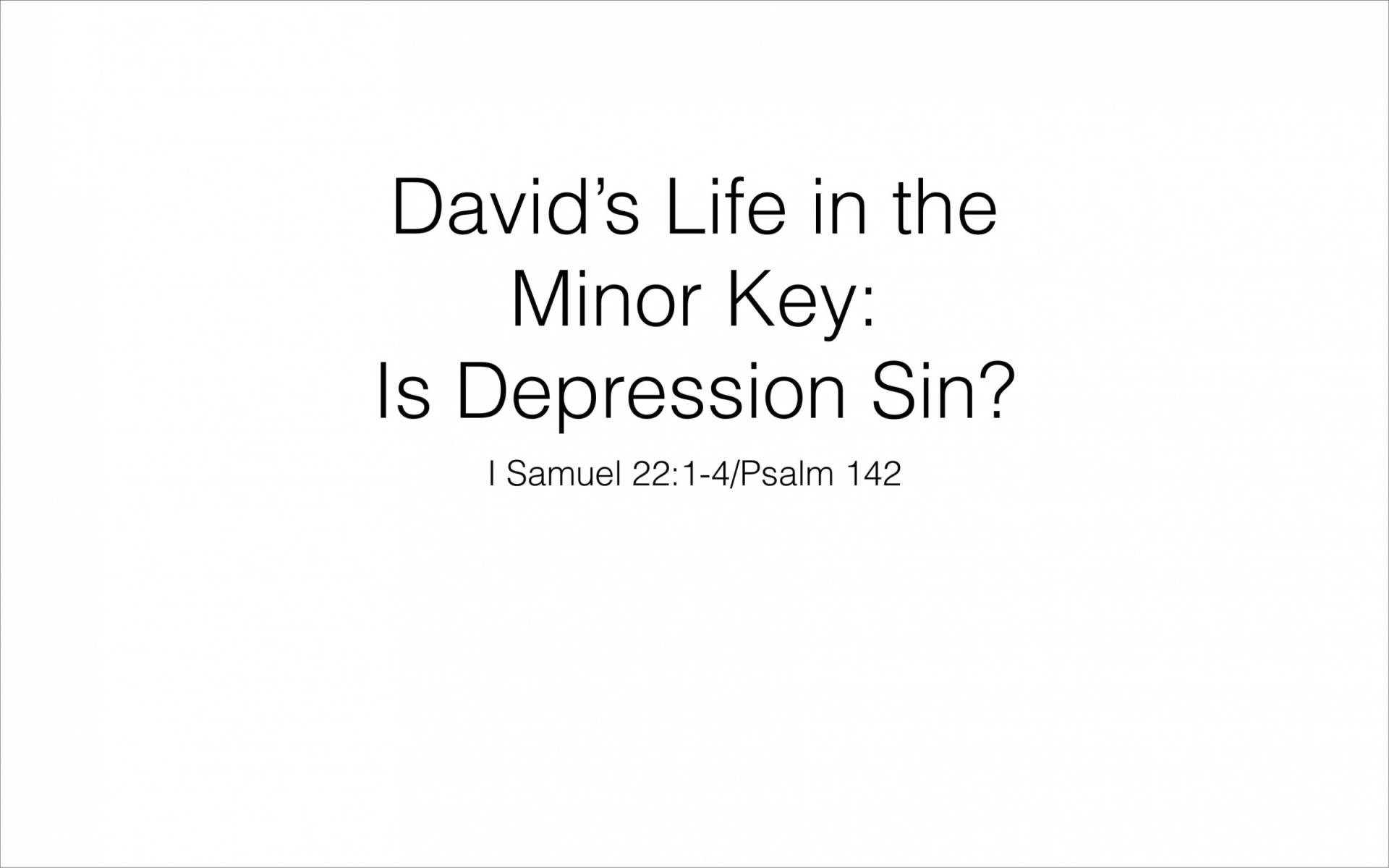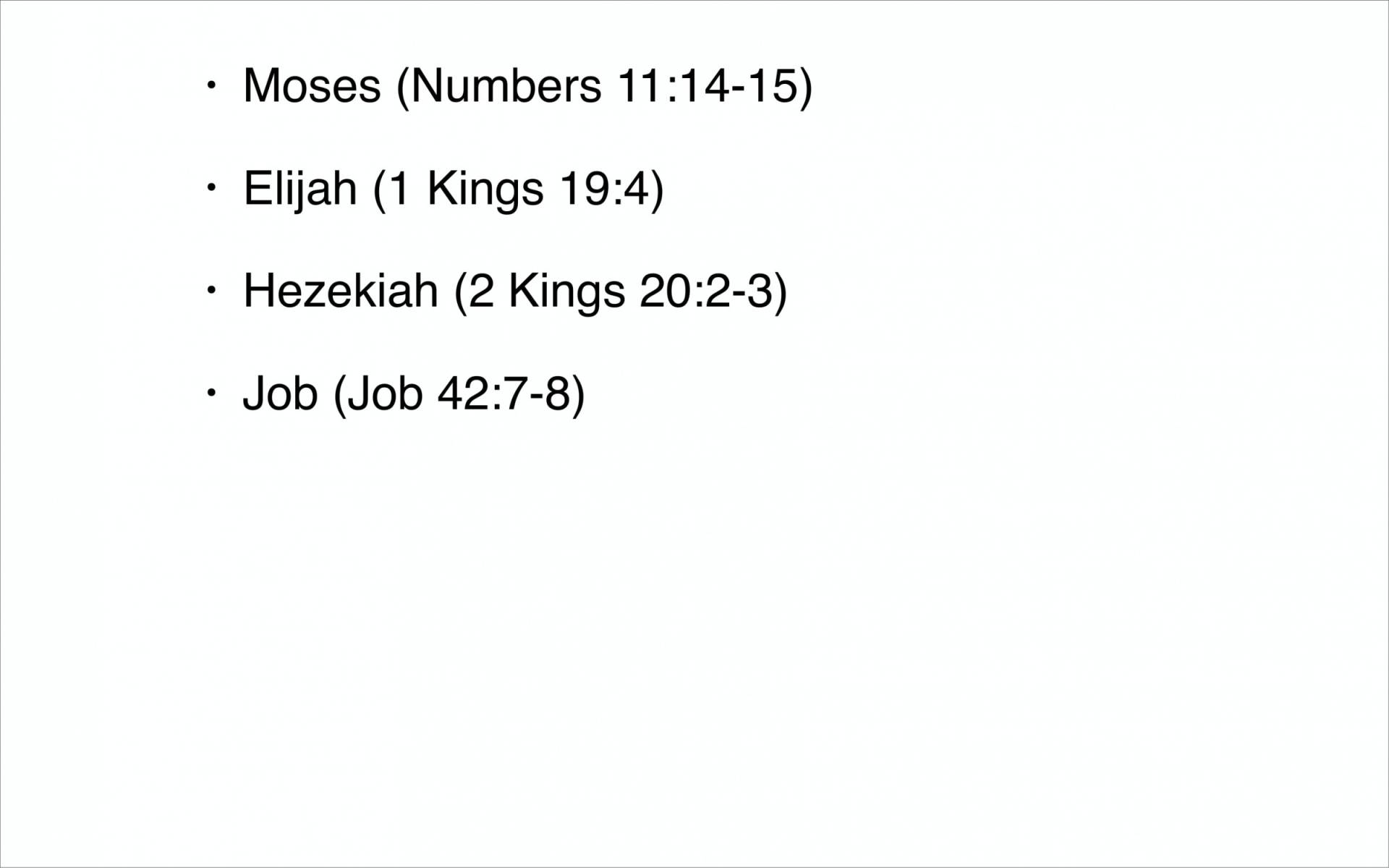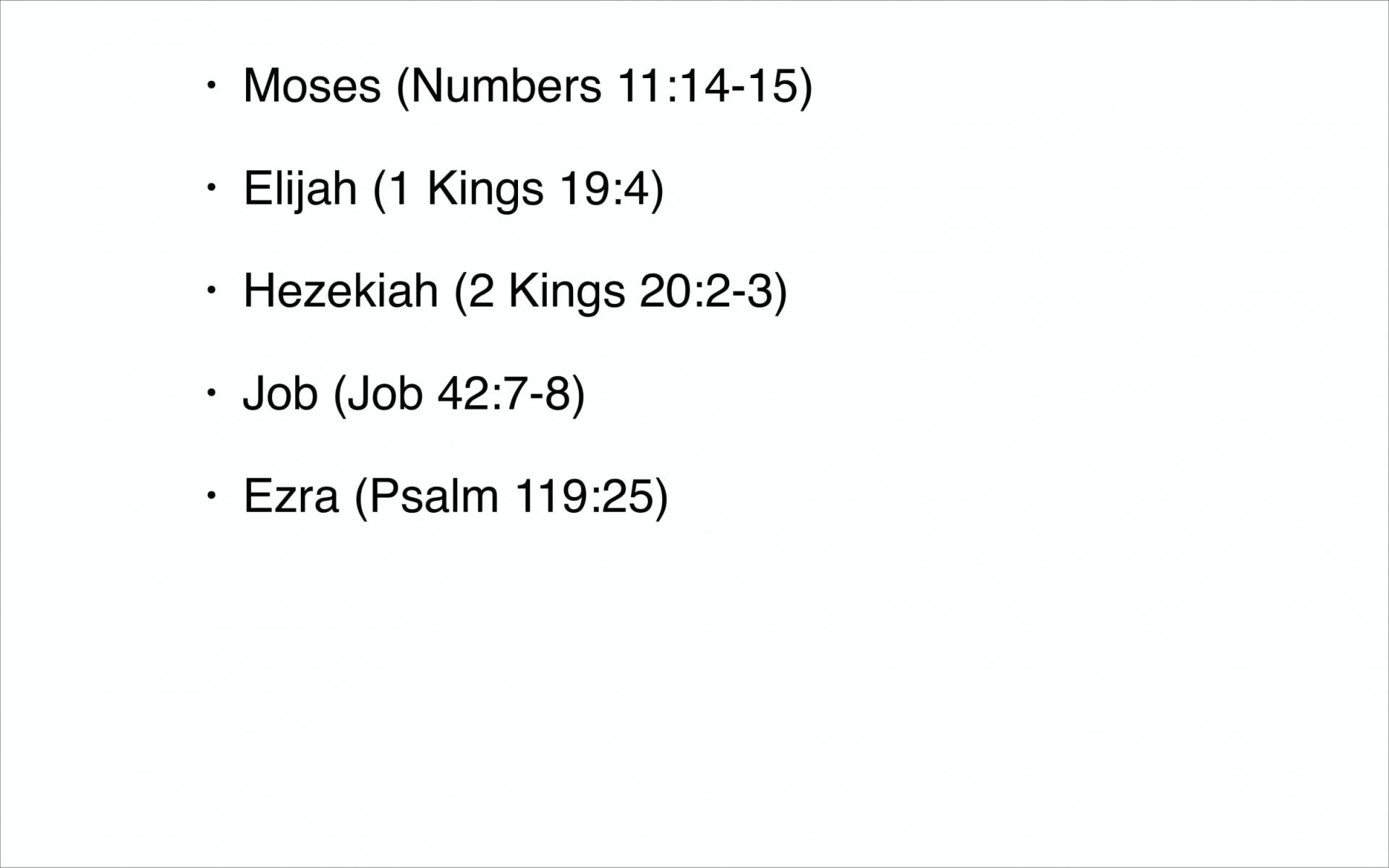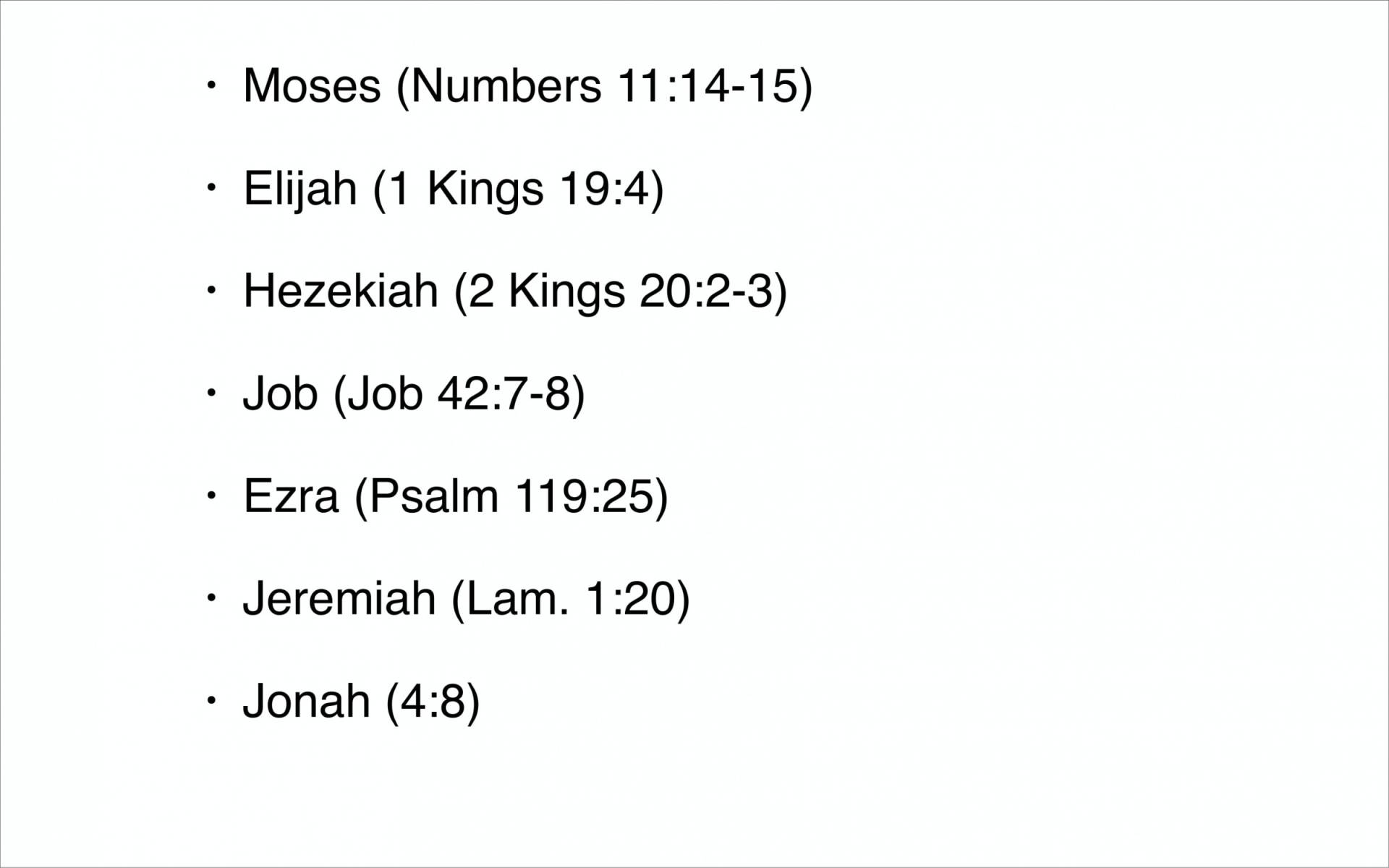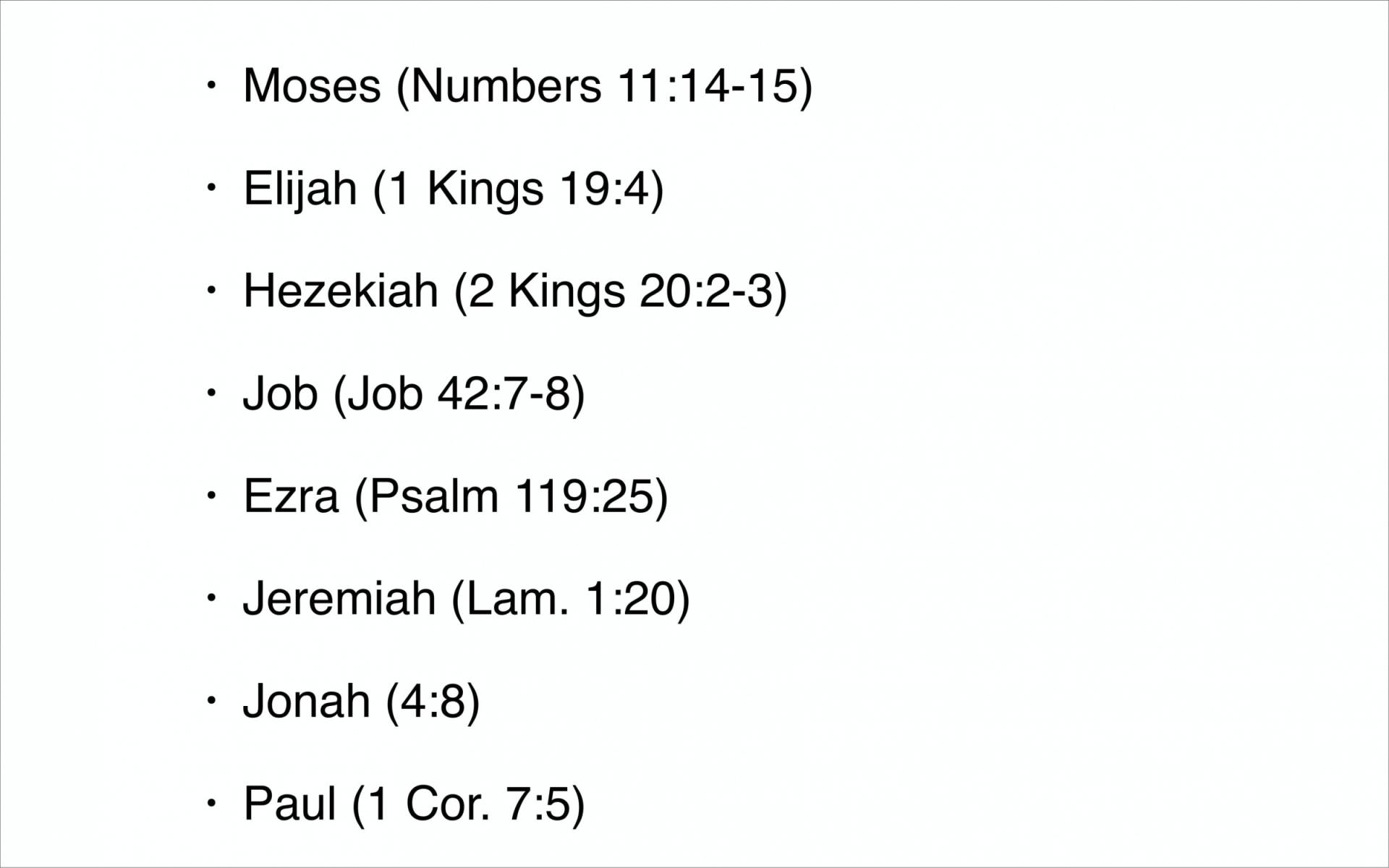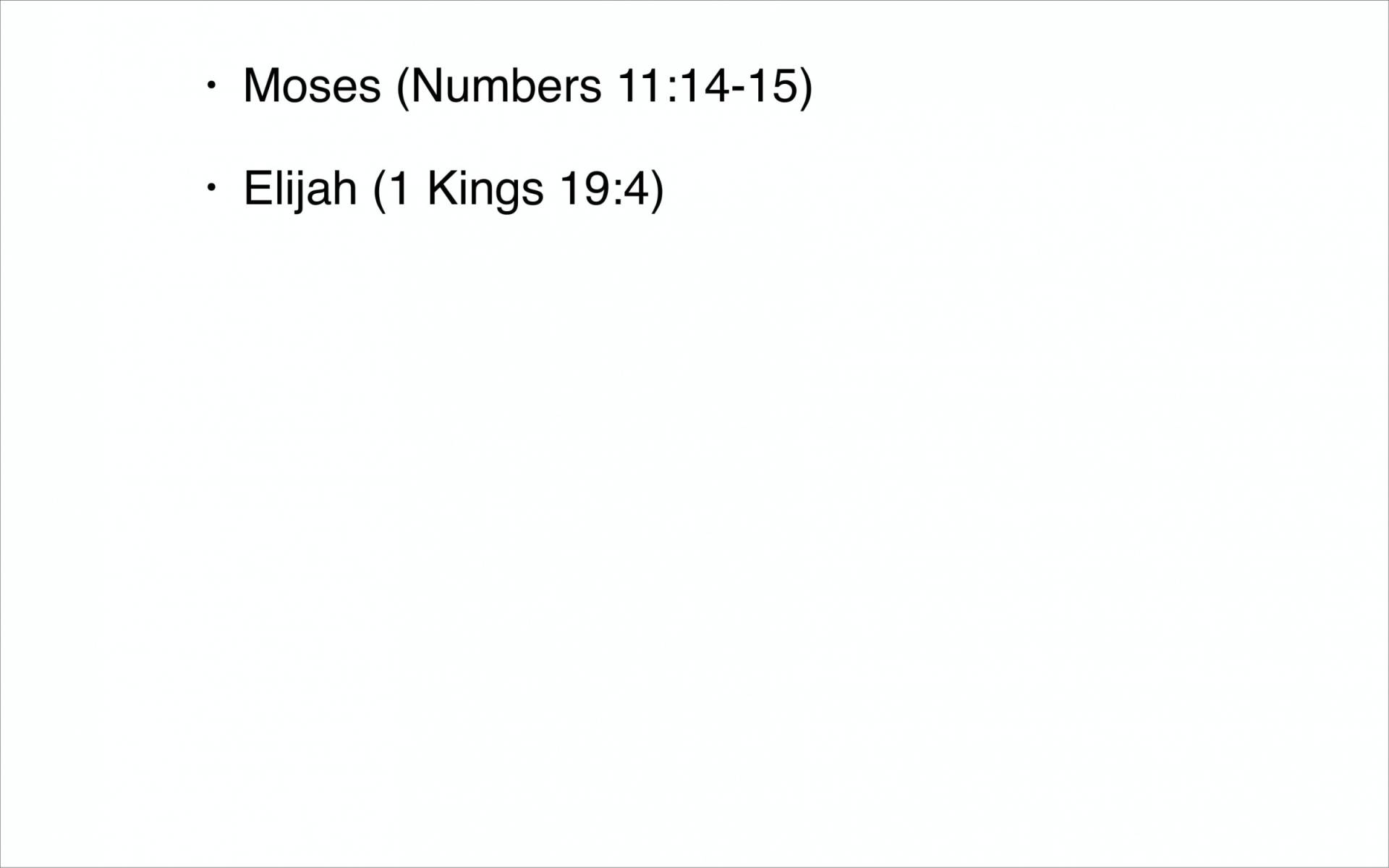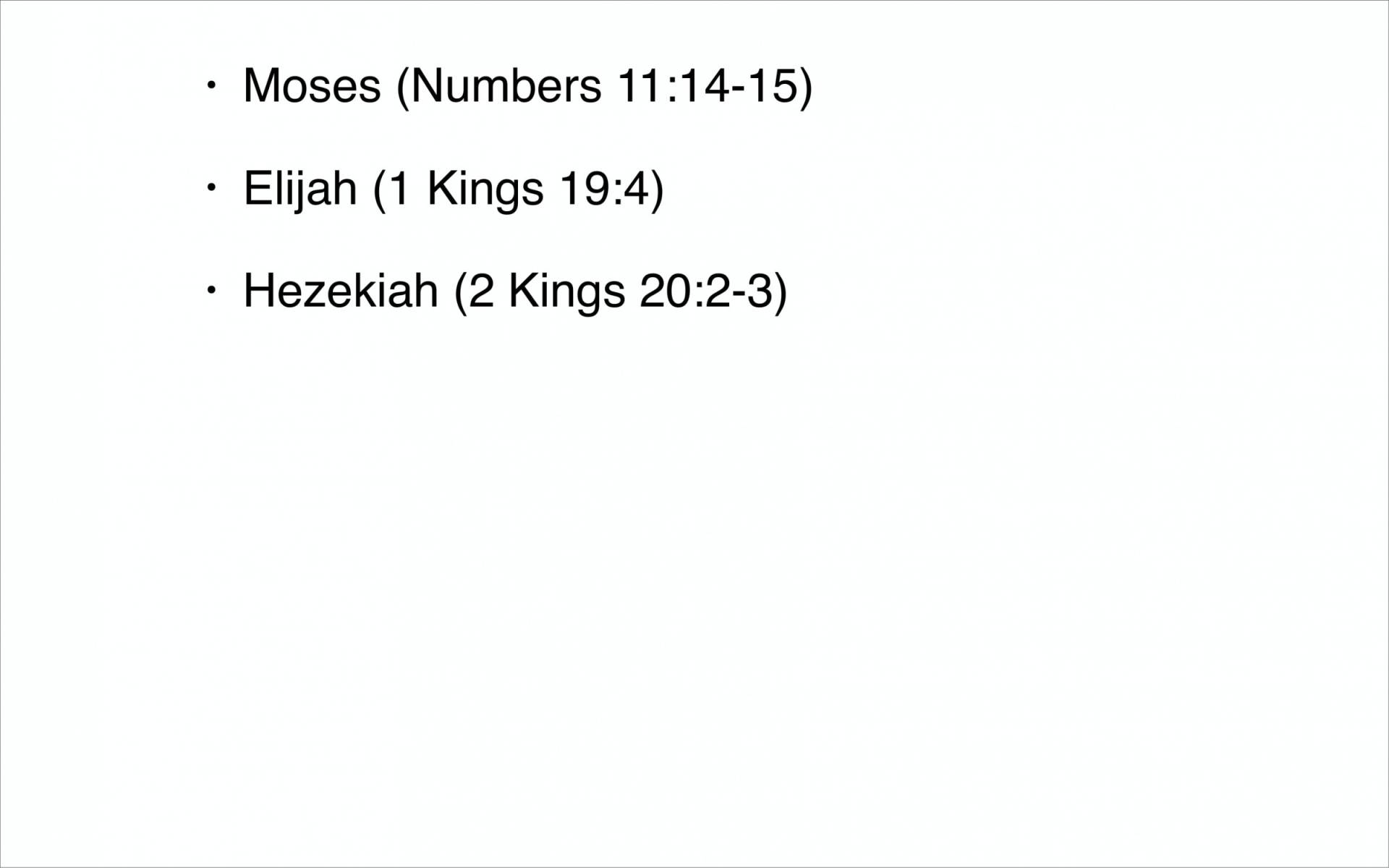Is Depression Sin
BC&D-45
140129WE
David’s Life in the Minor Key:
Is Depression _________________?
I Samuel 22:1-4/Psalm 142
Most of the Bible is in the major key. Saints fearlessly witnessing, churches valiantly serving against all odds—and what a joy those sections are to our
souls. But side-by-side with all that is the minor key. God’s Word contains true glimpses into the weaknesses and frailties that God understands and shows us in the lives of some of His greatest saints. These are men and women who were sad, discouraged, and depressed—yet the Lord does not correct them and tell them they are in sin. He just encourages them and helps them go on. Life in the minor key—is it always sin that makes us depressed? Is it always a
sin to be depressed? No is the answer from God’s Word.
Life in the _________________________
If you’ve ever felt trapped, imprisoned, or helplessly caught by life, then you share the emotions of David in the midst of life in the Cave of Adullam. Things had gotten so bad that David makes a confession that is packed with meaning to us today. In the form of an urgent prayer offered to God, and captured for us on paper, David explains that his soul is in prison. The setting is so graphic, look at it with me in I Samuel 22.
David is in the midst of his life on the run, under immense stress in verses 1-4:
1 David therefore departed from there and escaped to the cave of Adullam. So when his brothers and all his father’s house heard it, they went down there to him. 2 And everyone who was in distress, everyone who was in debt, and everyone who was discontented gathered to him. So he became captain over them. And there were about four hundred men with him. 3 Then David went from there to Mizpah of Moab; and he said to the king of Moab, “Please let my father and mother come here with you, till I know what God will do for me.” 4 So he brought them before the king of Moab, and they dwelt with him all the time that David was in the stronghold.
David describes this time as when he felt trapped, with nowhere to escape in Psalm 142. Here in this Psalm written from a cave, David reflects on the
circumstances all around him that made him have: David’s Imprisoned ______________________________ Look down and find the seventh verse. Listen to the insight David gives us about what is going on inside of him at this hard time in his life. This description is so powerful. Bring my soul out of prison, that I may praise Your name; the righteous shall surround me, for You shall deal bountifully with me. — Psalm 142:7
A more understandable expression of “soul in prison” would be depression. David wanted to get out of depressions prison because it kept him for praising
the Lord. When we get depressed, life really does feel like an endless pursuit of nothingness. Such daily struggles are a far cry from the expectations of those
who heard this type promise before they became a Christian: “Just get saved and everything will be great from then on!” But that’s not always true, is it?
Even saved people can go through emotionally imprisoning cave times like David experienced. Trigger that can start a slide downward emotionally are:
family conflicts; losing a job; losing a home; moving to a new location under duress; working with a tough crowd; being betrayed by friends; being wronged in a business deal; suffering the sudden loss of a family member, friend, or finances, and so forth.
Suffering from depression is a very common malady. In fact, although most of the Bible is in the major key (saints fearlessly witnessing as churches valiantly
serve against all odds), side-by-side with all those wonderful testimonies is the minor key where God’s Word contains true glimpses into the weaknesses and
frailties of some of His greatest saints. If you look closely you find that they with us today had:
A _________________________ STRUGGLE
What did Moses, Elijah, Hezekiah, Job, Ezra, Jeremiah, Jonah, and Paul all share in common with David as well as us today? They were all spirit-filled servants of the Lord who struggled with negative emotions. In light of this, we must be careful to never say that anxiety, depression, discouragement, and other negative emotions are in themselves sinful because we see these same emotions in some of God’s greatest servants.
Even Jesus experienced negative emotions:
In Christ we see anger that is not sin, plus deep emotional distress, grief, and anguish—all of which were perfectly displayed. In the Garden of Gethsemane, he “began to be very distressed and troubled. And He said to them, ‘My soul is deeply grieved to the point of death’ ” (Mark 14:33-34). Jesus, in coming to earth, took upon himself the form of a human with all its frailties, yet he did not sin. The key is not to call each occurrence of a negative emotion sin—the key is to get out of there. That is what David explains to us. “The Christian who remains in sadness and depression really breaks a commandment: in
some direction or other he mistrusts God—His power, providence, forgiveness.”1
Webster’s definition of “depression” gives us a fascinating insight into ways this negative emotion can also affect believers:
1. a state of feeling sad; a disorder marked especially by sadness, inactivity, difficulty in thinking and concentration, a significant increase or decrease in appetite and time spent sleeping, feelings of dejection and hopelessness, and sometimes suicidal tendencies
2. A reduction in activity, amount, quality, or force; a lowering of vitality or functional activity
Eight Famous _________________________ Characters who Struggled with Depression
Each of the following servants of the Lord suffered from crippling and sometimes even paralyzing depression:
1. __________________________________ (Numbers 11:14-15): “I am not able to bear all these people alone, because the burden is too heavy for me. If You treat me like this, please kill me here and now—if I have found favor in Your sight—and do not let me see my wretchedness!” Moses was confessing that he could not humanly do what had to be done. But this state of mind was actually a blessing because when he felt squashed and depressed by his work, he came to an end of self-reliance and learned to trust the Lord more fully.
2. _________________________________ (1 Kings 19:4): He stood alone against an entire nation, an entire army. He also stood alone against the most heinous and wicked of all the corrupt religious people of the day, including Jezebel, whose name is synonymous with sin, the occult, and wickedness. But after all that life in the major key, after his greatest time of victory Elijah slid into depression: But he himself went a day’s journey into the wilderness, and came and sat down under a broom tree. And he prayed that he might die, and said, “It is enough! Now, LORD, take my life …!” This despondency followed having 850 angry prophets of Baal destroyed on Mount Carmel and then outrunning a chariot! This took supernatural courage, strength, and faith. But when he heard the rumor that Jezebel wanted to kill him, he became dejected. In spite of his great victories, Elijah wasn’t perfect; when wearied and
drained emotionally, he was subject to being overcome by complete discouragement. However, God didn’t rebuke him for that negative emotion; He first dealt with the physical causes of Elijah’s depression before teaching the spiritual lesson he needed to learn. Then remember that James 5 says that Elijah was subject to the same struggles as we all face.
3. ___________________________________ (2 Kings 20:2-3): When facing a terminal illness, … he turned his face toward the wall, and prayed to the LORD, saying, “Remember now, O LORD, I pray, how I have walked before You in truth and with a loyal heart, and have done what was good in Your sight.” And Hezekiah wept bitterly. Turning his face to the wall was an act of desperation, but God Lord didn’t say his bitter weeping was wrong. Instead, He responded to Hezekiah’s prayer with patience and gentleness and added fifteen years to his life.
4. ___________________________________: “Why did I not die at birth? Why did I not perish when I came from the womb?” (Job 3:11). Job felt like he couldn’t go on any longer! So he poured out his woes to the Lord: “I cannot eat for sighing; my groans pour out like water …. My life flies by—day after hopeless day …. I hate my life …. For God has ground me down, and taken away my family …. But I search in vain. I seek him here; I seek him there,
and cannot find him …. My heart is broken. Depression haunts my days. My weary nights are filled with pain …. I cry to you, O God, but you don’t answer me” (Job 3:23-24; 7:6, 16; 16:7; 23:8; 30:16-17, 20, LB). In his depression over losing his property and children, the Bible said that … Job did not sin nor charge God with wrong (Job 1:22). As he suffered through trial after trial, feeling abandoned by even God, Job was never rebuked for having negative feelings. However, the Lord did reprove his three friends for accusing him of sin and for failing to speak what was right about God, as Job had (Job 42:7-8).
5. ___________________________________: His was a stellar personality! Tradition records that he memorized the entire Old Testament, wrote an entire book by his name plus another incredible, longest of all chapters in the Bible (Psalm 119). But look at his testimony in Psalm 119:25: My soul
clings to the dust; revive me according to Your word. Note that he didn’t say: “In my wicked sinfulness I’m clinging to the dust.” No, he simply said,
“That’s how life is!” After much research, and forty years of reading Psalm 119, I am persuaded that Psalm 119 is Ezra’s personal testimony as well as the
probable content of his teaching and preaching to the exiles who came home to Jerusalem to seek the Lord.If you study Psalm 119 closely, it is filled with Ezra’s constant struggles with both people and his emotions. He also made a wonderful prayer request—“revive me”—because he knew the Lord was his only hope and source of strength to get through his struggles.
6. _________________________________: Look at his painful declaration: “See, O LORD, that I am in distress; my soul is troubled; my heart is overturned within me, for I have been very rebellious. Outside the sword bereaves, at home it is like death (Lamentations 1:20). What was he talking about? Jeremiah didn’t like what he saw happening to Jerusalem! He was rather like a CNN on-the-spot news correspondent watching Nebuchadnezzar destroy the city and butcher the people. Thus, as he wrote about the smoke rising and the carcasses being piled up, he cried out to the Lord, “I don’t like what’s going on!” Being “rebellious” didn’t mean that Jeremiah was fighting against the Lord; he was just struggling greatly with acceptance of what the Lord was allowing in Jerusalem. In his heartbreak, he was freely expressing that grief to God.
7. __________________________________: This incredibly empowered prophet of the Lord, whom the Lord rescued from death in the midst of the sea, probably saw the single greatest evangelistic impact that anyone has ever had— Nineveh’s hundreds of thousands of people who all turned to the Lord
and repented. But after that amazing ministry, he crashed emotionally: And it happened, when the sun arose, that God prepared a vehement east wind; and the sun beat on Jonah’s head, so that he grew faint. Then he wished death for himself, and said, “It is better for me to die than to live” (Jonah 4:8).
8. _____________________________________: His comments on troubled times are insightful: … When we came into Macedonia our flesh had no rest, but we were afflicted on every side: conflicts without, fears within (1 Corinthians 7:5 NASB). What was Paul going through here? He was depressed. Was that a sin? No, it was a common result of his having “had no rest.” He was in the most Roman of the Roman Empire, just coming from Asia Minor where the pagan idolatry and emperor worship was very strong. Like David, Paul was constantly pursued, so he eventually became weary and fearful for
his life. But, as he wrote Timothy, he understood that fear is always the realm of Satan: … God has not given us a spirit of fear, but of power and of love and of a sound mind (1Timothy 1:7). Although Satan buffeted a vulnerable Paul with conflicts and fears until depression set in, he refused to remain in that state.
How did this mature saint, who had mastered much of the Old Testament and wrote books for the New Testament, find comfort in his distress? Through the ministry of another believer! He testified: … God, who comforts the depressed, comforted us by the coming of Titus …” (1 Corinthians 7:6 NASB). By this, we can conclude that the Lord is grieved if we find fault with a brother or sister in Christ who is feeling “down.” The God of All Comfort wants us to be encouragers of His suffering children— not discouragers!
Some Modern Examples
In later centuries, have God’s servants fared any better than these from the Bible? Let’s look at three of the world’s best known saints:
1. Martin __________________________ (1483-1546): In perhaps his deepest depression, this Reformer wrote one of Christendom’s greatest hymns
“A Mighty Fortress Is Our God.” Like other great saints, he recognized the spiritual warfare involved in his struggles. In 1527 he wrote: “For more than a week I was close to the gates of death and hell. I trembled in all my members. Christ was wholly lost.” In his journal he said that at this point he picked up his ink well and threw it at the devil! Satan was so vivid to him that he not only felt his presence in the room but could also see him. If you go to Lutherstadt in Wittenberg, the ink’s black stain is still visible on the wall of Luther’s study.
Here is Luther’s testimony of the great discoveries he made about God while he described himself as being: in melancholy, heaviness, depression, dejection of spirit—downcast, sad, and downhearted:
A mighty fortress is our God, a bulwark never failing;
Our helper He, amid the flood of mortal ills prevailing:
For still our ancient foe doth seek to work us woe;
His craft and power are great, and, armed with cruel hate,
On earth is not his equal.
Did we in our own strength confide our striving would be losing;
Were not the right Man on our side, the Man of God’s own choosing:
Dost ask who that may be? Christ Jesus, it is He;
Lord Sabaoth is His Name, from age to age the same,
And He must win the battle.
For nineteen years after Luther described his personal experience in varied terms: melancholy, heaviness, depression, dejection of spirit; downcast, sad, and downhearted. Now this is the man who translated the whole Bible into the language of the people, who single handedly by God’s grace turned the tide of the darkness of Romanism and actually put the light up and shined it on the Scriptures and turned the tide in what we call the Reformation- getting back the heart of salvation, the justification by faith and our adherence to Scriptures.
His biographer, Baynton, said this: He suffered in this area for much of his life and often revealed these struggles in his works. Evidently he did not think it a shameful problem to be hidden. Rather he shared it so that the saints could come beside him and encourage him. That’s what Martin Luther’s life was a testimony of. Not hidden in a cloistered cell going through his angaffectum as he called it but the saint sharing with other saints his need for their compassion and help. But his hope was always in the Lord. He shared his struggles with negative emotions so that believers could come beside him and
encourage him. That’s what his life was—a testimony—not hidden in a cloistered cell of anguish, but a saint sharing with other saints his need for their compassion and help.
2. Charles Haddon __________________________ (1834-1892): This famous preacher lit the fires of the nineteenth-century revival movement. His
poor health caused Spurgeon to struggle so severely with depression that he was forced to be absent from his pulpit for two to three months a year. In 1866, at the age of 32, he told his congregation of his struggle: “I am the subject of depressions of spirit so fearful that I hope none of you ever get to such extremes of wretchedness as I go to.”
Spurgeon’s marvelous ministry in London made him perhaps the greatest preacher England ever produced. Having a unique photographic mind, he knew the Bible inside and out plus the contents of all 25,000 volumes in his library. I’ve been in his church and seen his library, which has been enshrined. And this God-hearted servant left a legacy of inspired writings that still blesses us today! But if defeating depression is merely learning more verses, if it’s knowing more doctrine, if it’s having more truth then it’s impossible to make it because he had about the max. No, Spurgeon, like Luther and the Old Testament saints all had to find their encouragement only in the Lord!
3. Dr. John Henry ___________________________ (1864-1923): After Spurgeon, he was the next great man of God who was also called in his day “The Greatest Preacher in the English-Speaking World.” He pastored leading churches, preached to huge congregations, and wrote books that were
bestsellers. In a message he confessed: “You seem to imagine that I have no ups and downs, but just a level and lofty stretch of spiritual attainment with unbroken joy and equanimity. By no means! I am often perfectly wretched and everything appears most murky.”
If you’ve likewise felt “murky,” you can empathize with God’s stellar luminaries who led the way in doctrine and preaching after refinement periods that prompted struggles with negative emotions. The “Who’s Who of Ministry” is chock-full of such testimonies.
When Life Gets ________________________
As we look back on history, many of these saints, like Spurgeon, suffered because their physical conditions led to depression. One Christian medical doctor who has spent his lifetime helping people writes this: Consider this thought experiment. Give me the most saintly person you know. If I were to administer certain medications of the right dosage, such as thyroid hormone, or insulin, I could virtually guarantee that I could make this saint anxious with at least one of these agents. Would such chemically induced anxiety be explained as a spiritual sin? What if the person’s own body had an abnormal amount of thyroid hormone or insulin and produced nervousness?2 It is not helpful to immediately club someone when you meet an Elijah running and sitting and sucking their thumb (as Howard Hendricks said) under a broom tree somewhere you don’t have to take out a bat and say “confess” or you’ll never feel better because God didn’t do that. What did he do? He fed him, rested him and encouraged him then told him there’s more than what you’re going through.
It is possible to feel horrible and be in great emotional anguish and still be obedient to the Lord. As we saw, listen again to what Job cried out in the midst
of his suffering.
Just before we look at Paul’s life let me read to you how Job describes what Paul was going through.
“I cannot eat for sighing; my groans pour out like water…. My life flies by—day after hopeless day….I hate my life…. For God has ground me down, and taken away my family…. But I search in vain. I seek him here; I seek him there, and cannot find him…. My heart is broken. Depression haunts my days. My weary nights are filled with pain…. I cry to you, O God, but you don’t answer me'” (3:23-24; 7:6, 16; 16:7; 23:8; 30:16-17, 20, LB).
Notice that even with his depression, the Bible says, “In all this Job did not sin” (1:22). Moreover, God reproves Job’s friends for accusing Job of sin and for
their “failure to speak rightly concerning my servant Job” (42:7-8). Let’s look at a modern day Job in the New Testament, the Apostle Paul.
PAUL _____________________ HIS STRUGGLES
2 Corinthians 1:8 For we do not want you to be ignorant, brethren, of our trouble which came to us in Asia: (that’s modern day Turkey) that we were burdened beyond measure, Have you ever heard the term hyperbole? That’s a Greek word, we’ve brought it into English- that’s the word “measure”. Hyperbole means the same thing in English as it does in Greek- it’s speaking in the biggest words possible. So what he said is we were burdened beyond what is measurable- the greatest number possible– above strength, he says I don’t have any dunamis left for the preaching of the cross—foolishness to those who perish but to us who believe it’s the dunamis of God- it’s above my dunamis, my strength– so that we despaired even of life.
There are ten different words for suffering in Greek. Paul uses five of them in this little section. He exhausts the Greek language for the anguish, the struggles, the emotional, physical and spiritual affliction he was going through. Paul uses five of those words right here in this letter of Second Corinthians.
Most frequently he uses thlipsis. This word means “narrow, confined, under pressure.” In 2 Corinthians it is translated affliction (2 Corinthians 2:4; 4:17),
tribulation (2 Corinthians 1:4), and trouble (2 Corinthians 1:4, 8). Paul’s emotions responded to his circumstances. He felt hemmed in by difficulties, and the only way he could look was up.
And that is exactly the lesson David had learned a thousand years before Paul, in Psalm 142. As believers our joy is internal, and like our hope is from above. Look at Paul in 2 Corinthians 1:8. Even though Paul was discouraged by his circumstances, he still had spiritual joy. That’s where we check out sometimes. We equate our joy and happiness with circumstances and Paul detached them from his circumstances. His circumstances caused his body and emotions to be squashed and weighed down and his spirit had a choice and that was that he was going to look up but it didn’t change his emotions it just produced enduring hope.
We are not surprised then when we read that the great Apostle Paul was “pressed out of measure” and “despaired even of life” (2 Corinthians 1:8). Great
as Paul was in all of his spiritual maturity, he was still human just like the rest of us. When Paul did an inventory of his emotional state he described his emotions as battered as if besieged on a battlefield—with no possible earthly escape. 2 Corinthians 4:8-9 We are hard-pressed on every side, yet not crushed –by the way these are beautiful words and in Greek; and they rhyme—he was a brilliant communicator and he used words that parallel each other and had a beautiful cadence to them as you read them it would be kind of like saying we’re surrounded but not cut off; and he was using military terms. He says we’re completely surrounded but the one place they can’t surround us is up and we’re not cut off. But he didn’t say that he was freed from being completely surrounded or hard-pressed on every side. Continuing in verse 8: we are perplexed, but not in despair (pressed at every side but never abandoned by God); 9 persecuted, but not forsaken; (end of way out but not end of hope) they are pursuing us with danger to us but we are not forsaken, we have our hope in Godstruck down, but not destroyed (knocked down but not knocked out).
Paul Was Depressed but Not ____________________________
Paul also in another book said that he experienced “great sorrow and unceasing grief” (Rom. 9:2) over the plight of unbelieving Israel. But no matter
what his emotional state, or his circumstances, Paul knew that God is in control. Later he wrote, “We were afflicted on every side; conflicts without, fears within. But God, who comforts the depressed, comforted us by the coming of Titus” (2 Corinthians 7:5-6 NASV). So the mighty Paul was depressed. Paul did not deny the way he felt, nor does God want us to deny our emotions. Because of this spiritual transparency and honesty–Paul was never ashamed to ask Christians to pray for him. In at least seven of his letters, he mentioned his great need for prayer support (Rom. 15:30–32; Eph. 6:18–19; Phil. 1:19; Col. 4:3; 1 Thessalonians 5:25; 2 Thessalonians 3:1; Philemon 22). Paul confesses his struggles in fact he calls him self a sunagonizomai, sunathelates. The Greek preposition “sun” means “with”; and he said I’m a fellow contender and struggler with you. He always let them know he was right where they were. Paul and the believers in Corinth were helping each other by prayer.
THEY SHARED STRUGGLES, THEY SHARED ___________________
Difficulties should draw us closer to other Christians as we share our burdens. Difficulties can be used to glorify God. So, when you find yourself in the trials of life, remember what God has promised us, and what He has commanded us to do. Look at 2 Corinthians 1:11. “you also helping together in prayer for us, that thanks may be given by many persons on our behalf for the gift granted to us through many.” 2 Corinthians 1:11 The word sunopourgeo translated “helping together” is used only here in the Greek New Testament and is composed of three words: ‘with, under, work’. It is a picture of laborers under the burden, working together to get the job accomplished. Paul was so squashed that he could not make it on his own. He had the Lord, He never left him but he needed “with under work.” He needed others helping together in prayer.
Paul enlists the help of other believers holding him up in his emotional, physical, and spiritual struggles. This was in addition to the promise we have that the Holy Spirit also assists us in our praying and helps to carry the load. Likewise the Spirit also helps in our weaknesses. For we do not know what we should pray for as we ought, but the Spirit Himself makes intercession for us with groanings which cannot be uttered. (Romans 8:26) Paul knew the Holy Spirit was interceding for him and helping him in his infirmities, still he enlisted the help of others.
Turn back to I Thessalonians 5. In this chapter there are more imperative commands than any other paragraph in God’s Word. It is one of the clearest descriptions of the basic duties of a believer in Christ’s church. We must take seriously Paul’s commands:
These Are Our Marching ________________________ as Believers
1 Thessalonians 5:11-26 (NKJV):
1. v.11a Therefore comfort each other and
2. v. 11b edify one another, just as you also are doing. 12 And we urge you, brethren, to recognize those who labor among you, and are over you in the Lord and admonish you, 13 and to esteem them very highly in love for their work’s sake.
3. v. 13b Be at peace among yourselves.
4. v. 14a Now we exhort you, brethren, warn those who are unruly, Page 15
5. v. 14b comfort the fainthearted,
6. v. 14c uphold the weak,
7. v. 14d be patient with all.
8. v. 15a See that no one renders evil for evil to anyone
,9. v. 15b but always pursue what is good both for yourselves and for all.
10. v. 16 Rejoice always,
11. v. 17 pray without ceasing,
12. v. 18 in everything give thanks; for this is the will of God in Christ Jesus for you.
13. v. 19 Do not quench the Spirit.
14. v. 20 Do not despise prophecies.
15. v. 21a Test all things;
16. v. 21b hold fast what is good.
17. v. 22 Abstain from every form of evil. 23 Now may the God of peaceHimself sanctify you completely; and may your whole spirit, soul, and body be preserved blameless at the coming of our Lord Jesus Christ. 24He who calls you is faithful, who also will do it.
18. v. 25 Brethren, pray for us.
19. v. 26 Greet all the brethren with a holy kiss.
Three ____________________ for Ministering to the Depressed Note these three key truths for helping others in Biblical Counseling & Discipleship:
First, Paul said in v. 14b, for believers to “________________________________________ (or comfort) the fainthearted…”
You know what that is? You’ve heard of oligarchy- the rule of the fewwell it’s the same word- “olig” which means few and “suche” is small or few spirited- it’s someone who we would call in the minor key- they’re always down here.
The word comfort is a fascinating word- it’s to speak closely to them- to talk in their ear- like talking someone into coming into the window from
out on the ledge. Rescuing them from imminent disaster.
Did you know every time we meet together there are some oligosuche’s some small spirited people around us? And you know what they need?
Someone to stand close to them and talk to them and comfort them like Titus did. When Paul was depressed he was comforted by the coming of Titus.
Second, Paul said in v. 14c, for believers to: “_______________________ (or uphold) the weak…”
There are some people- Jude talks about them who constantly have to be pulled out of stuff. We are commanded to uphold the weak. Well why don’t they get strong? They’re in sin. He doesn’t say that. Did you know that there are fainthearted people and they’re always going to be that and no matter how much you preach and pray and how much you teach they will still be fainthearted and they can carry the biggest Bible- it’s just part of how the church is made up and that’s why we have strong hearted and we have the weak hearted and they are to minister to one another.
Third, Paul said in v. 14d, for believers to: “be ______________________ with all men.” There will always be ones who seem to never have a problem; and the ones who always seem to have endless problems. These are present active imperatives. I command you to do that Paul says. How did Paul get out of those times? How do we when we’re pressed on every side and our emotions are caving in and we feel like a submarine at the bottom of the ocean with the weight of the world on us? We all get out the same way. We get out by getting into the Lord, we look up, we cry out, and we go on by God’s grace, even when we don’t feel like it. That’s what David writes about in the 142nd Psalm. He found the way to make great discoveries about God when I’m down here in the cave. So let’s go back in our minds to three thousand years ago and the harsh conditions of the cave of Adullam to see what else God was teaching David in
his Cave of Troubles.
David’s Testimony on How to _____________________ Depression
At this point, David was at the depth of loneliness. He had been on the run for years and was now hiding in a desolate cave in the midst of a crowd of malcontents—feeling very much alone. He had two choices: (1) stay in the cave of loneliness and descend into selfpity and sin, or (2) look up to God and use this time alone to grow in the Lord.
David—a man so prone to doubt, discouragement, and depression—chose to look up to God for strength to overcome his battles with negative emotions. Psalm 142 reveals what kept him from being sidelined and paralyzed by depression in the cave of Adullam. David wrote down how God helped him to not get his life and emotions dragged down by those around him. As we read these verses note the emotional condition of everyone that joined up with David. They were a very needy group. And in all their need, they invaded the life of someone just coming out of the pits. It was just the right recipe for a relapse by David into despair and a return into the pits. But the good news is—that didn’t happen, and the reason why is just what we are going to learn from God’s Word. What did this tough crowd around David do to him? They depressed him! How did David, so prone to doubt, discouragement and depression—overcome this hard, troublesome time? Psalm 142 holds the key!
Trapped in a cave David baby sat four hundred fellow fugitives. That’s his address in Psalm 142. From the cave of Adullam he looks up and discovers some great truths about God. So can we.
Confessions From a ______________________ Man
Please listen to David’s cry from the cave in Psalm 142:1-7 (NKJV):
Psalm 142 A Contemplation of David. A Prayer when he was in the cave. I cry out to the Lord with my voice; with my voice to the Lord I make my supplication. 2 I pour out my complaint before Him; I declare before Him my trouble. 3 When my spirit was overwhelmed within me, Then You knew my path. In the way in which I walk They have secretly set a snare for me. 4 Look on my right hand and see, For there is no one who acknowledges me; Refuge has failed me; No one cares for my soul. 5 I cried out to You, O Lord: I said, “You are my refuge, My portion in the land of the living. 6 Attend to my cry, For I am brought very low; Deliver me from my persecutors, For they are stronger than I. 7 Bring my soul out of prison, That I may praise Your name; The righteous shall surround me, For You shall deal bountifully with me.”
Let me take you on a quick journey through this Psalm. What simple lessons can we find in cave times?
Use Lonely (Depression’s Cave) Times to ____________________
Depression is like a little light on the dashboard of your car warning you of a problem like low tire pressure. You know what that means? You have an opportunity; either you can do something about the low tire pressure or you will be on the side of the road somewhere. It says oil needs changing or your
overheated or low fuel. Again you can either be upset at the car or you can do something about it. Those warnings are actually a blessing and depression is a warning that there’s something we need and we can grow through those times. One of the greatest truths we can discover is that these lonely cave times, when we feel trapped and imprisoned by our circumstances and emotions–usually accomplish great discoveries about God.
David is at the depth of loneliness. He has been on the run for years and now he is hiding in a desolate cave in a crowd of malcontents, feeling very much
alone. He has two choices. Stay in the cave of loneliness, descend into self-pity and sin or look up and use the time alone to grow. Psalm 142 is the classic confession of David when he was a caveman, alone and depressed. God satisfied him completely as he discovered great things about God. Remember, a heart that flees to God for refuge, will always be satisfied. Remember the cities of Refuge? Each one was a completely supplied place, easy to access and their gates were never locked. There were people pointing the way for you and couriers always running. Always remember those wonderful truths. What do we find as we examine the life of David? DAVID was always fleeing to Christ as his refuge. In this overview of the dark days in David’s life, we see how his needs were always met by the Lord.
Cave Times Are Usually Accompanied By Great ______________
Psalm 142:3-4 When my spirit was overwhelmed within me, Then You knew my path. In the way in which I walk They have secretly set a snare for me. 4 Look on my right hand and see, For there is no one who acknowledges me; Refuge has failed me; No one cares for my soul.
In the middle of great troubles there are usually some associated symptoms of depression.
• David felt “overwhelmed in spirit” (v.3a): “Roof caving in!”; “Everything going wrong at once!”; “Always happens to me!”; “Not now!”; “I have some bad news”.
• David thought his adversaries had “hidden a trap for me” (v.3b): “They’re all after me”; “I’ve been railroaded”; “Framed”.
• David feared that “no one regards me” (v.4a): “No one called…”; “I’m a nobody”; “Poor me…”; “I’m all alone”. Either he could descend into selfpity and focus on his own problem or he could make another choice. He fled to the One he knew did care for him. That’s where faith comes in and that’s what he exercises.
• David also feared that there was no escape for me- “Refuge has failed me”; (v.4b): “One-way trip to nowhere with my job”; “You’re TOO old”; “I’m sorry but the qualifications for this position…”
• Finally, David felt that no one cares for my soul (v.4c). Have you ever let THESE DEADENING THOUGHT CROSS YOUR MIND? They will bring
gloom as fast as a storm front in a summer thunderstorm.
But hold on – Cave Times Usually Accomplish ____________________
Discoveries About God
Look at this series of truths he discovers: Psalm 142:5-7 “I cried out to You, O Lord: I said, “You are my refuge, My portion in the land of the living.”
No one cares for me? You care for me. No where to escape? You are my way of escape. He didn’t get out of the cave. In the cave he found the Lord was there. God did not deliver the three Hebrews from the fiery furnace; He came into the furnace with them.
6 “Attend to my cry, For I am brought very low; Deliver me from my persecutors, For they are stronger than I. 7 Bring my soul out of prison”,
Set me free, undo the shackles enough so that I can do these things:
#1 “That I may ___________________ Your name”; Now you know that you’re bordering on a time when you have to make a choice in the right direction when you can’t praise the Lord. You have to cry out to Him and say “Lord, I want You to bring my soul out of prison so I may praise you name.
#2 “The righteous shall _________________________ me”, We must make a choice to go where the righteous are. The Bible does not say that it is incumbent on everyone—the shepherds are supposed to go after the sheep but the sheep are supposed to stay here and minister to one anther.
#3 “For _____________ shall deal bountifully with me.” Cave Times Open _____________________ We Never Dreamed of
For Knowing God Intimately
As we look there, why don’t you take a moment and mark these for someone else who may need them someday. Or even for you if you ever feel the twinge
of loneliness in your life. Look now and find:
• When depressed I learn that You alone are my true REFUGE. Psalm 142:5a: I cried out to You, O LORD: I said, “You are my refuge, Imprisoned emotions mean it’s time to ________________ to your Refuge. Prayer: I will believe Your promise and turn to You as my Refuge right now.
• When depressed I learn that You alone are my true PORTION. Psalm 142:5b: My portion in the land of the living. Imprisoned emotions mean it’s time to ______________ on your Portion. Prayer: I will believe Your promise to be all I need in this hard time.
• When depressed I learn that You alone are my true LISTENER. Psalm 142:6 ‘Give heed my cry’: Imprisoned emotions mean it’s time to __________________ to your Master. Prayer: I will believe Your promise and pour out all my troubles to You who care for me.
• When depressed I learn that You alone are my true DELIVERER Psalm 142:7a: “bring my soul out of prison” Imprisoned emotions mean it’s time to ______________ in your Redeemer. Prayer: I will believe Your promise and let You rescue me now.
• When depressed I learn that You alone are my true OBJECT OF WORSHIP Psalm 142:7b: That I may praise Your name; Imprisoned emotions mean it’s time to ______________________ your Lord. Prayer: I will believe Your promise and worship You even when I don’t feel like it.
• When depressed I learn that You alone are my true PROVIDER “the righteous will surround me, for You shall deal bountifully with me” Psalm 142:7c:
Imprisoned emotions mean it’s time to ____________________ in His Sufficient Provision.
Prayer: I will believe Your promise and let You surround me now with everything I need. If you’ve ever felt trapped, imprisoned, or helplessly caught by life, then you share the emotions of David in the midst of life in the Cave of Adullam. And when that happens, make the same urgent call to Heaven that David did, and allow the Lord to set you free from the prison of depression.
Discussion Questions
1. Like David, as well as most of us, the men named below were all spirit-filled saints who struggled with negative emotions. Consider these confessions:
• Moses: “I am not able to bear all these people alone, because the burden is too heavy for me” (Numbers 11:14).
• Elijah: “It is enough! Now, LORD, take my life!” (1 Kings 19:4).
• Hezekiah: When facing a terminal illness he turned his face toward the wall … [and] wept bitterly (2 Kings 20:2a, 3b).
• Job: “Why did I not die at birth? Why did I not perish when I came from the womb?” (Job 3:11).
• Ezra: My soul clings to the dust; revive me according to Your Word (Psalm 119:25).
• Jeremiah: “See, O LORD, that I am in distress; my soul is troubled; my heart is overturned within me” (Lamentations 1:20).
• Jonah: “It is better for me to die than to live” (Jonah 4:8).
• Paul: Our flesh had no rest but we were afflicted on every side: conflicts without, fears within (2 Corinthians 7:5 NASB).
Without exception, each of them found the same cure for depression that Ezra sought in Psalm 119:25. What was it?
2. David was at the depth of loneliness after being on the run for years and having to hide in a desolate cave with a crowd of malcontents. He could have either wallowed in self-pity and sin or used his time alone to grow in the Lord. David chose God’s way; and the Holy Spirit inspired him to write Psalm 142. Read verses 1–2. What was the very first thing David did? In verse 2, what did he do next? Did you note how freely he told the Lord what was troubling him?
3. Read Psalm 142:3–4, which contains common symptoms of depression during hard times. What are they? If you have been troubled with despondency, here are some practical steps to help you break free:
• Deal with sin. Read Ephesians 4:27 and 1 John 1:9. Are you applying these truths daily? Is something blocking your fellowship with the Lord that you need to repent of?
• Share your burdens with the Lord. Read Psalm 103:14; 55:22; 1 Peter 5:7. Could there ever be anything in your life that God doesn’t care about?
• Abandon self-pity. Read Luke 9:23. Ask the Lord to help you run with endurance the race that is set before [you], looking unto Jesus, the author and finisher of [your] faith (Hebrews 12:1–2).
4. When David felt abandoned by everyone, he drew closer to God and declared: I cried out to You, O LORD: I said, “You are my refuge” (Psalm 142:5). Suddenly, David knew that, because GOD cared for him, the Lord was his way out of his despondency and troubles. Upon whom or what are you depending when you feel overwhelmed? Are you using your times of feeling alone to draw closer to God? Have you been praying Psalm 142:5 back to the Lord?
5. Read Psalm 142:6–7. When David appealed to the Lord for deliverance in his afflictions, what reason did he give for such a plea? Was it merely for personal relief from his distress? Or for a far greater purpose?
6. Rather than give in to depression, God wants to help you take your focus off yourself and reach out to other Christians by sharing burdens and praying for one another. Read 1 Thessalonians 5:14–22. Ask the Lord for divine grace to implement such a ministry in your own life—regardless of your circumstances.
1 A. J. Mason, “The Epistles of Paul the Apostle to the Thessalonians,” in Ellicott’s Commentary on the Whole Bible, vol. 8, p. 145.
2 Dwight L. Carlson, M.D., Exposing the Myth that Christians Should Not Have Emotional Problems,. Dr. Carlson is the author of several books, including Why Do Christians Shoot Their Wounded? (IVP), from which this article has been adapted. He lives with his wife in Torrance, California.
Slides
Check Out All The Sermons In The Series
You can find all the sermons and short clips from this series, Biblical Counseling & Discipleship Class here.
Looking To Study The Bible Like Dr. Barnett?
Dr. Barnett has curated an Amazon page with a large collection of resources he uses in his study of God’s Word. You can check it out here.


